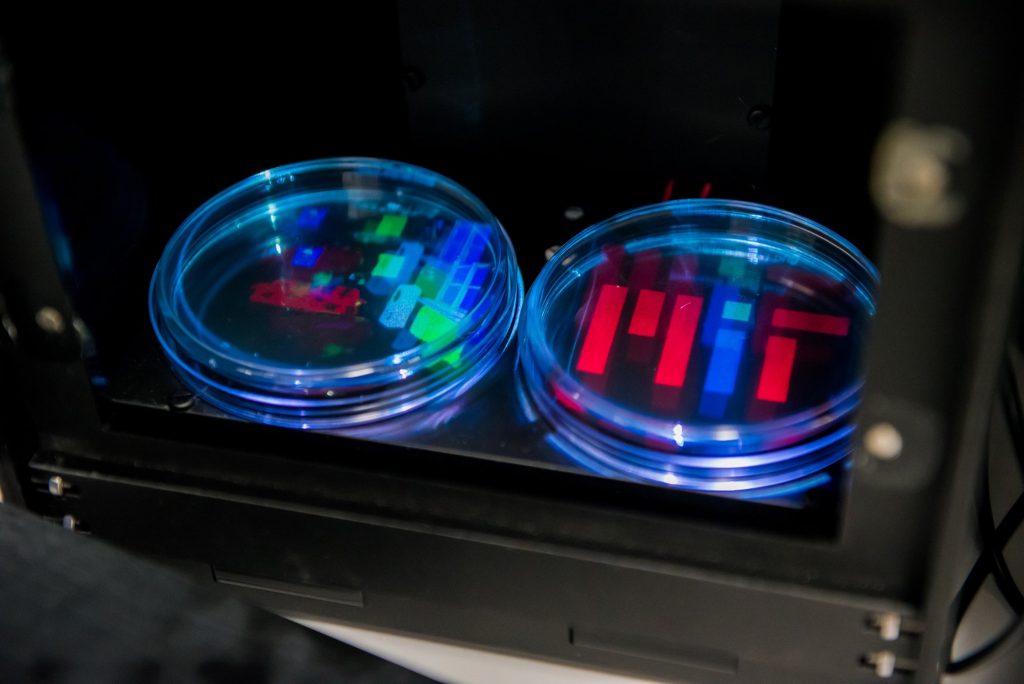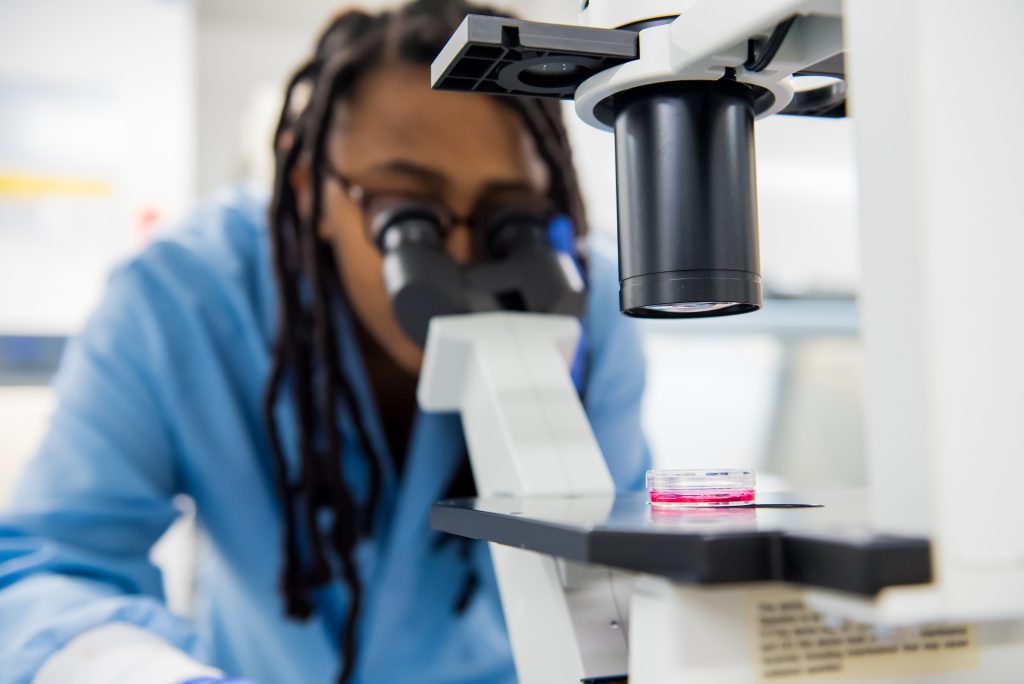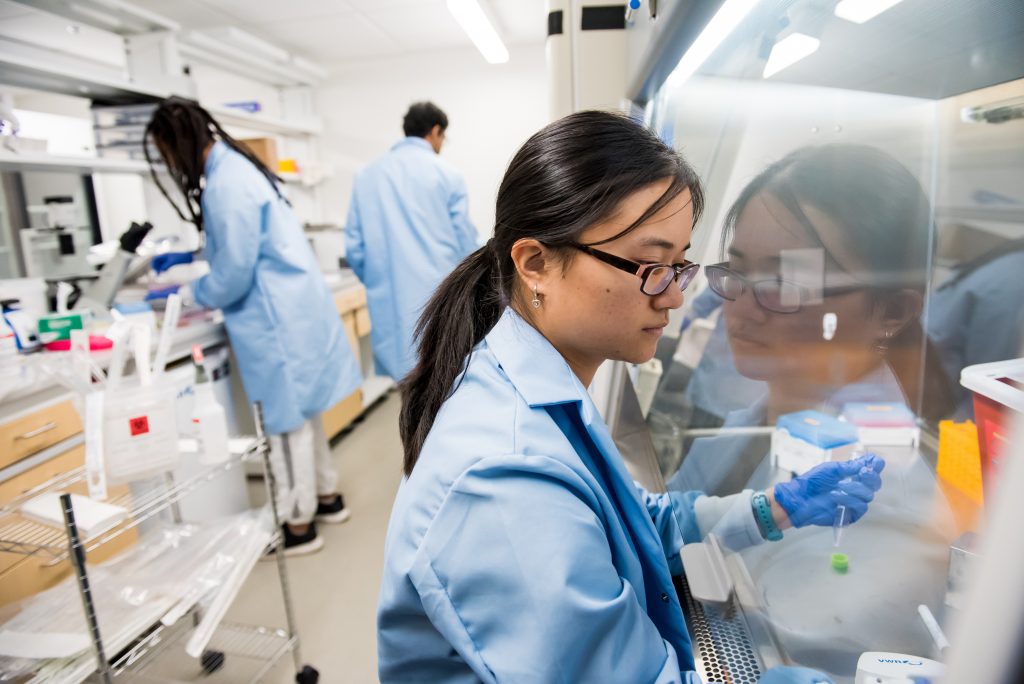The MIT BioMaker Group holds student workshops each semester and over IAP. From working in a lab for the first time to creating your own project, our workshops are open to all students interested in exploring biology. Visit the Current Offerings page to sign up for workshops and view which ones are actively running in the space!
Bacterial Photography



Biology can be designed and engineered! Synthetic biology is a field that uses genetic engineering techniques and rational design to create novel biological systems for a range of applications. In this workshop, you will explore a bacterial photography system in which an engineered strain of E. coli responds to red, green, and blue light by producing pigments that dye the agar in a petri dish with the corresponding colors. You will briefly examine the system design and then dig in to get hands-on experience in the BioMaker Space wet lab. No biological laboratory experience necessary! To conclude, you will put a plate of your engineered bacteria in a special photograph developing incubator with a built-in projector to create a bacterial print of your favorite image!
Biobots


Can you grow a robot? Why not!?! In this project you will try making a living, growing, moving “robot” actuated by lab-grown, muscle cells. Living machines leverage the world’s most advanced technology – biology – to create devices that not only better model and integrate with existing biology, but could also transform other areas of technology to become self-assembling, self-healing, and more. In this project, you will explore the exciting fields of biofabrication, tissue engineering, and genetic engineering. Your end result, rings of muscle tissue grown in the lab and hooked up to small, mechanical actuators. The muscle cells are engineered so that their contraction can be controlled by pulses of light.
Biocement
This workshop introduces students to the process of biocementing with microbes. Today, the production of cement for concrete accounts for 8% of global CO2 emissions. Microbially Induced Calcium Carbonate Precipitation (MICP) is a promising biocement alternative. The process makes use of microbes to catalyze calcium carbonate crystals that can bind aggregate together. In this workshop, you will learn lab protocols for using the bacteria to biocement aggregate including cultivating the microbe, preparing solutions to induce crystal formation, and biocementing loose sand. We will test different experimental parameters to characterize and optimize the process as well as 3d printing custom designs to make your own fun biocemented sample!
CRISPR-Cas9
The emergence of new techniques such as recombinant DNA technology has revolutionized biological research and the development of biologics for therapeutic purposes over the past few decades. Since then, advancements that take advantage of the structural features and sequence specificity of DNA allow us to further create tools for gene editing and drug and vaccine delivery. This workshop introduces the theory behind designing a CRISPR-Cas9 system to knock out a gene of interest in E. coli and also teaches basic laboratory skills such as transformation and setting up experimental controls! Future versions of this workshop will also expand to include gene editing in yeast, as well as CRISPR-Cas13 for diagnostic systems.
ELISA Workshop
ELISA, or Enzyme Linked ImmunoSorbent Assay is a plate-based biological quantification technique. It can be used to quantify soluble proteins and hormones, or determine affinity between two reagents. In this workshop, students will conduct an ELISA plate assay and assess the affinity between a capture protein and an antigen by producing a binding curve and determining the dissociation constant (Kd).
Stomata Imaging
Gas exchange in plants is an important process regulated by stomata, which open and close in response to different factors such as light or the presence of pathogens. This workshop uses a microscope to visualize how stomata respond to a variety of factors!
Community Project Workshop
Join other self-motivated students with a love for biology and maker-culture for our 4-week IAP BioMaker Community Project Workshop! This is a project-based research workshop conducted in MIT’s new Huang-Hobbs BioMaker Space. Students will work together to initiate the first batch of BioMaker Community Projects, which were sourced from MIT labs and currently include honey-microneedle fabrication to engineering synthetic cell-swarming behavior. These projects already have momentum, but need to be adapted and brought in-house so that our community can continue to build the projects over the following semesters. The primary goal of this class is to equip students from different courses or interests with the fundamental laboratory skills needed to develop and debut BL2 “Community Projects” that will be open to community involvement, and nucleate a core group of passionate BioMakers who will continue to be involved in these projects and the creation of new ones. Enrollment is limited and preference will be given to people who signed up first and show deep interest in continuing the project following IAP. No lab experience required.
…And more to come!
Bio-Electrochemical Systems
Yeast Surface Display/Lateral Flow Assay
Expansion Microscopy
Bioreactor Workshop
